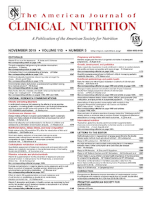
AMERICAN JOURNAL OF CLINICAL NUTRITION
Scope & Guideline
Pioneering discoveries in nutrition and dietary practices.
Introduction
Aims and Scopes
- Clinical Nutrition and Dietetics:
Research focusing on the application of nutrition in clinical settings, including the management of diet-related diseases and conditions such as obesity, diabetes, cardiovascular diseases, and gastrointestinal disorders. - Public Health Nutrition:
Studies investigating the relationship between dietary patterns, nutrition policies, and health outcomes in populations, addressing issues such as food security, dietary guidelines, and public health initiatives. - Nutritional Biochemistry and Metabolism:
Exploration of the biochemical processes and metabolic pathways influenced by dietary components, including the effects of vitamins, minerals, fatty acids, and other nutrients on health and disease. - Maternal and Child Nutrition:
Research focused on nutrition during pregnancy, lactation, and early childhood, examining how maternal dietary practices affect child growth, development, and long-term health outcomes. - Nutritional Epidemiology:
Epidemiological studies that assess dietary intake patterns, nutritional status, and their associations with chronic diseases, utilizing large cohort studies and population-based data. - Innovative Nutrient Delivery and Supplementation:
Investigations into the efficacy and safety of dietary supplements, functional foods, and novel nutrient delivery systems to enhance health and prevent deficiencies.
Trending and Emerging
- Plant-Based Diets and Health Outcomes:
There is a growing body of research exploring the health benefits and potential risks associated with plant-based diets, including their impact on chronic disease prevention and management. - Gut Microbiota and Nutrition:
Emerging studies are increasingly focusing on the relationship between dietary patterns and gut microbiota composition, exploring how these interactions affect overall health and disease risk. - Sustainable Diets and Environmental Impact:
Research is expanding to include the environmental sustainability of dietary choices, assessing how food systems can be optimized for both health and ecological preservation. - Nutrition in the Context of COVID-19:
The pandemic has spurred interest in the role of nutrition in immune function and disease prevention, with numerous studies investigating dietary interventions to mitigate COVID-19 risks. - Precision Nutrition and Personalized Diets:
Emerging themes include the development of personalized nutrition strategies based on genetic, metabolic, and microbiome profiles, aiming to optimize individual health outcomes. - Food Insecurity and Nutrition Security:
Research addressing the intersections of food insecurity, nutrition access, and public health is gaining momentum, highlighting the need for systemic solutions to improve dietary quality in vulnerable populations.
Declining or Waning
- Traditional Dietary Practices:
Research on traditional diets and their health impacts has become less prominent, as the focus shifts towards modern dietary patterns and their implications for chronic disease prevention. - Nutritional Supplements without Contextual Evidence:
There is a waning interest in studies examining the effectiveness of supplements in isolation, as the emphasis is increasingly on whole food approaches and dietary patterns. - Single Nutrient Research:
Investigations centered solely on the effects of individual nutrients are becoming less common, with a growing preference for studies that consider the synergistic effects of dietary patterns. - Food Processing and Nutritional Quality:
While still relevant, research specifically focused on the impacts of food processing on nutrition is receiving less attention compared to broader themes such as sustainability and food systems. - Aging and Nutrition Without Comprehensive Context:
Research that examines aging and nutrition without considering the multifactorial influences of lifestyle, environment, and genetics is declining in frequency.
Similar Journals

Current Nutrition Reports
Exploring the Frontiers of Nutritional Science.Current Nutrition Reports, published by SpringerNature, stands at the forefront of nutrition and food science research, providing an invaluable resource for researchers, professionals, and students alike. Since its establishment in 2012, the journal has gained recognition for its significant contributions to the field, achieving a prestigious Q1 ranking in both Food Science and Nutrition and Dietetics categories as of 2023. With an impact factor reflecting its critical position in the academic community, this journal is dedicated to disseminating high-quality reviews and reports that synthesize the latest findings on nutritional science, public health, and dietetics. Although it operates under a non-open access model, its extensive reach and influence in prominent databases like Scopus, where it ranks in the top percentiles, underscore its importance in shaping the future of nutrition research. As the journal anticipates converging years until 2024, it promises to remain a vital platform fostering scholarly dialogue and innovation in the dynamic realm of nutrition.
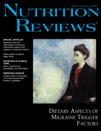
NUTRITION REVIEWS
Elevating Understanding of Dietetics Through Peer-Reviewed InsightsNUTRITION REVIEWS, published by Oxford University Press Inc, stands as a premier journal in the fields of Nutrition and Dietetics and Medicine, achieving an impressive Q1 ranking in both disciplines for 2023. With a rich history dating back to 1942, this journal serves as a crucial platform for the dissemination of high-quality, peer-reviewed research focused on nutrition science, dietary trends, and their implications for health. Researchers, professionals, and students alike benefit from its comprehensive reviews that bridge the gap between theory and practical application, enhancing understanding and encouraging academic discourse. Although it does not operate under an open-access model, its significant impact factor and dedicated readership underscore its relevance and authority in the field. Covering an extensive range of topics, NUTRITION REVIEWS is committed to advancing knowledge, informing policy, and shaping future research in nutrition.
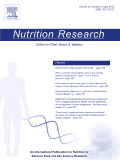
NUTRITION RESEARCH
Bridging Science and Practice in Nutrition ResearchNUTRITION RESEARCH, published by PERGAMON-ELSEVIER SCIENCE LTD, stands as a pivotal platform for the dissemination of groundbreaking research in the fields of nutrition, dietetics, and endocrinology. With an established track record since 1981, the journal has successfully converged its academic purview into 2024, providing a continuous source of high-impact studies that address critical issues in human health and nutrition. Recognized as a Q2 journal in multiple relevant categories, including Endocrinology and Nutrition, as well as boasting respectable Scopus rankings, it serves a diverse audience of researchers, professionals, and students eager to enhance their understanding of nutritional science. Although the journal does not operate on an open access model, its contributions are invaluable, fostering advancements and collaboration within the scientific community dedicated to improving dietary practices and outcomes. The current address of the journal is THE BOULEVARD, LANGFORD LANE, KIDLINGTON, OXFORD OX5 1GB, ENGLAND, positioning it at the heart of global research initiatives.

Nutrients
Elevating the discourse in food science and nutrition.Nutrients is a premier, peer-reviewed open access journal published by MDPI, dedicated to advancing the field of nutrition and dietary research. Since its inception in 2009, this journal has consistently garnered acclaim, achieving a Q1 ranking in both Food Science and Nutrition and Dietetics, reflecting its significant impact in these vital areas of study. With a robust Scopus ranking of #40 out of 389 in Food Science and #18 out of 140 in Nutrition and Dietetics, Nutrients has established itself as a leading platform for researchers, practitioners, and students aiming to share and gain insights into nutritional epidemiology, dietary interventions, and policy implications. Hailing from Basel, Switzerland, the journal ensures broader accessibility through its open access model, inviting diverse contributions that enhance our understanding of nutrition in health and disease. By fostering collaboration across disciplines, Nutrients not only serves as a resource for high-quality research but also encourages innovation essential for tackling global nutritional challenges.

Nutrition & Metabolism
Fostering Innovation in Nutritional and Metabolic ResearchNutrition & Metabolism, published by BMC, is a leading open-access journal that has been pivotal in advancing research within the domains of nutrition, metabolic science, and endocrinology since its inception in 2004. With an impressive impact in its field, this journal boasts classification in the Q1 category in both Nutrition and Dietetics and Medicine (miscellaneous), as well as Q2 in Endocrinology, Diabetes and Metabolism for 2023. It ranks in the top percentiles of its Scopus categories, highlighting its significance to the scholarly community, with notable placements such as rank 22 out of 140 in Nutrition and Dietetics. The journal's commitment to open access ensures that groundbreaking research is readily available to researchers, practitioners, and students alike, fostering collaboration and innovation across disciplines. Based in the United Kingdom, Nutrition & Metabolism continues to shape the future of nutritional science and metabolic studies, inviting submissions that address pivotal questions and drive the field forward.

NUTRITION
Elevating understanding in nutrition and metabolism.NUTRITION is a prestigious peer-reviewed journal published by Elsevier Science Inc, dedicated to advancing the field of dietary practices and metabolism. With an ISSN of 0899-9007 and an E-ISSN of 1873-1244, this journal has been serving the academic community since its inception in 1987, showcasing high-quality research and reviews through 2024. Recognized for its significant contributions to the fields of Endocrinology, Diabetes and Metabolism and Nutrition and Dietetics, NUTRITION holds a commendable Q2 category ranking in both areas, reflecting its impactful presence with a Scopus rank of #26 out of 140 and #51 out of 244 in its respective categories. The journal primarily aims to disseminate innovative research findings that illuminate the complex interplay between nutrition and health, fostering a deeper understanding among researchers, healthcare professionals, and students alike. By bridging scientific inquiry with practical application, NUTRITION plays a vital role in shaping public health policies and dietary recommendations worldwide.
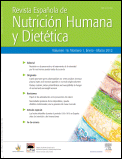
Revista Espanola de Nutricion Humana y Dietetica
Connecting researchers and practitioners in dietetics.Revista Espanola de Nutricion Humana y Dietetica is a pivotal open-access journal dedicated to advancing the study of human nutrition and dietetics. Published by the ASOC ESPANOLA DIETISTAS NUTRICIONISTAS in Spain, this journal has been making significant contributions to the field since its inception in 2011. With an ISSN of 2173-1292 and an E-ISSN of 2174-5145, it provides researchers and practitioners with a valuable platform for disseminating innovative research, case studies, and reviews related to nutrition science. Although currently ranked Q4 in both Food Science and Nutrition and Dietetics categories (2023), the journal is committed to raising its academic profile by fostering high-quality publications that address contemporary issues in nutrition. Open access since 2012, it ensures that research is readily available to a global audience, thus promoting the exchange of knowledge and best practices. Emphasizing the importance of dietary interventions and public health nutrition, the journal encourages contributions that bridge theory and practical applications, appealing to a broad spectrum of professionals, researchers, and students within the field.

JOURNAL OF NUTRITIONAL SCIENCE AND VITAMINOLOGY
Illuminating the Path to Nutritional ExcellenceJOURNAL OF NUTRITIONAL SCIENCE AND VITAMINOLOGY, published by the CENTER ACADEMIC PUBL JAPAN, serves as a vital platform for scientific inquiry into the fields of nutrition and vitaminology. Established in 1973, this peer-reviewed journal not only focuses on the biochemical aspects of nutrition but also addresses broader implications on health and disease prevention. With an ISSN of 0301-4800 and an E-ISSN of 1881-7742, it provides researchers, health professionals, and students access to novel studies and reviews that advance understanding in nutritional science. Though currently not an open access journal, it maintains a respectable position in academia, with a 2023 Quartile Q3 ranking in both Medicine (miscellaneous) and Nutrition and Dietetics, and Scopus rankings reflecting its growing influence. As the journal converges towards 2024, it remains committed to enlightening its audience on the latest research developments and fostering discourse within this essential scientific community.
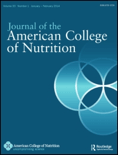
JOURNAL OF THE AMERICAN COLLEGE OF NUTRITION
Connecting Knowledge with Practice in NutritionThe Journal of the American College of Nutrition, published by Routledge Journals, Taylor & Francis Ltd, is a respected platform in the fields of Nutrition and Dietetics as well as Medicine. With an ISSN of 0731-5724 and an E-ISSN of 1541-1087, this journal plays a pivotal role in disseminating cutting-edge research and innovative practices related to nutritional science and health. Recognized for its significant impact, it holds a Q2 ranking in both Medicine (miscellaneous) and Nutrition and Dietetics, positioning it in the 86th and 85th percentiles respectively among global publications. Although the journal's coverage in Scopus has been discontinued as of 2021, it continues to serve the academic community by providing access to key studies and impactful findings. Based in the United Kingdom, this journal aims to bridge the gap between research and practice, supporting professionals, researchers, and students in advancing their understanding of nutrition's critical role in health and disease management.

Frontiers in Nutrition
Uncovering the multidimensional impact of nutrition on health.Frontiers in Nutrition, published by FRONTIERS MEDIA SA, is a leading open access journal dedicated to advancing the field of nutrition through rigorous research and innovative insights. Since its inception in 2014, it has established itself as a key resource for researchers, healthcare professionals, and policymakers interested in the multidimensional aspects of nutrition and its impact on health and disease. The journal boasts a commendable reputation with a quartile ranking of Q1 in Food Science and multiple Q2 rankings in Endocrinology, Diabetes and Metabolism, as well as Nutrition and Dietetics, reflecting its high-quality contributions to the scientific community. With an accessible platform that ensures the wide dissemination of knowledge, Frontiers in Nutrition is committed to fostering collaboration among experts and promoting findings that can lead to healthier populations worldwide. The journal encourages submissions that address the complex interplay between nutrition and health, thus bridging the gap between research and practical application. Join us in exploring how nutrition can enhance well-being and address global health challenges.